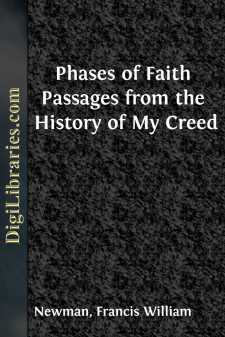Categories
- Antiques & Collectibles 13
- Architecture 36
- Art 48
- Bibles 22
- Biography & Autobiography 813
- Body, Mind & Spirit 142
- Business & Economics 28
- Children's Books 17
- Children's Fiction 14
- Computers 4
- Cooking 94
- Crafts & Hobbies 4
- Drama 346
- Education 46
- Family & Relationships 57
- Fiction 11829
- Games 19
- Gardening 17
- Health & Fitness 34
- History 1377
- House & Home 1
- Humor 147
- Juvenile Fiction 1873
- Juvenile Nonfiction 202
- Language Arts & Disciplines 88
- Law 16
- Literary Collections 686
- Literary Criticism 179
- Mathematics 13
- Medical 41
- Music 40
- Nature 179
- Non-Classifiable 1768
- Performing Arts 7
- Periodicals 1453
- Philosophy 64
- Photography 2
- Poetry 896
- Political Science 203
- Psychology 42
- Reference 154
- Religion 513
- Science 126
- Self-Help 84
- Social Science 81
- Sports & Recreation 34
- Study Aids 3
- Technology & Engineering 59
- Transportation 23
- Travel 463
- True Crime 29
Phases of Faith Passages from the History of My Creed
Description:
Excerpt
CHAPTER I.
MY YOUTHFUL CREED.
I first began to read religious books at school, and especially the Bible, when I was eleven years old; and almost immediately commenced a habit of secret prayer. But it was not until I was fourteen that I gained any definite idea of a "scheme of doctrine," or could have been called a "converted person" by one of the Evangelical School. My religion then certainly exerted a great general influence over my conduct; for I soon underwent various persecution from my schoolfellows on account of it: the worst kind consisted in their deliberate attempts to corrupt me. An Evangelical clergyman at the school gained my affections, and from him I imbibed more and more distinctly the full creed which distinguishes that body of men; a body whose bright side I shall ever appreciate, in spite of my present perception that they have a dark side also. I well remember, that one day when I said to this friend of mine, that I could not understand how the doctrine of Election was reconcilable to God's Justice, but supposed that I should know this in due time, if I waited and believed His word;—he replied with emphatic commendation, that this was the spirit which God always blessed. Such was the beginning and foundation of my faith,—an unhesitating unconditional acceptance of whatever was found in the Bible. While I am far from saying that my whole moral conduct was subjugated by my creed, I must insist that it was no mere fancy resting in my intellect: it was really operative on my temper, tastes, pursuits and conduct.
When I was sixteen, in 1821, I was "confirmed" by Dr. Howley, then Bishop of London, and endeavoured to take on myself with greater decision and more conscientious consistency the whole yoke of Christ. Every thing in the Service was solemn to me, except the bishop: he seemed to me a made-up man and a mere pageant. I also remember that when I was examined by the clergyman for confirmation, it troubled me much that he only put questions which tested my memory concerning the Catechism and other formulas, instead of trying to find out whether I had any actual faith in that about which I was to be called to profess faith: I was not then aware that his sole duty was to try my knowledge. But I already felt keenly the chasm that separated the High from the Low Church; and that it was impossible for me to sympathize with those who imagined that Forms could command the Spirit.
Yet so entirely was I enslaved to one Form,—that of observing the Sunday, or, as I had learned falsely to call it, the Sabbath,—that I fell into painful and injurious conflict with a superior kinsman, by refusing to obey his orders on the Sunday. He attempted to deal with me by mere authority, not by instruction; and to yield my conscience to authority would have been to yield up all spiritual life. I erred, but I was faithful to God.
When I was rather more than seventeen, I subscribed the 39 Articles at Oxford in order to be admitted to the University. Subscription was "no bondage," but pleasure; for I well knew and loved the Articles, and looked on them as a great bulwark of the truth; a bulwark, however, not by being imposed, but by the spiritual and classical beauty which to me shone in them....


